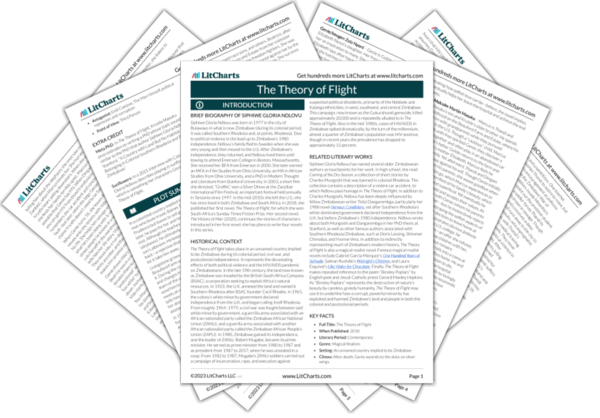The Man Himself Quotes in The Theory of Flight
Well, Marcus Malcolm Martin Masuku, you can be friends with my Genie here if you promise me one thing. Can you promise me one thing? […] Promise me that you will not become a politician . . . promise me you will become a real revolutionary instead.
The Man Himself told Bhekithemba that because the country was still young and working out its differences, and because civil wars often had repercussions, conflict was inevitable. However, the country had an image to portray and protect, and Western countries were waiting for it to fail. It was Bhekithemba’s job to ensure that the West did not receive any ammunition with which to destroy the country’s image.
Bhekithemba did not believe in love, at least not in romantic love. He understood the love one had for one’s parents and one’s country—but that sort of love was born of respect and gratitude. It was a sort of giving back. There was a reason for that kind of love. It was only natural to love the things that had given you life, a sense of place, a feeling of belonging, a connection to things beyond yourself. You could not exist without those things and so of course you loved them. It was a selfish love: a love of self-preservation. Selfish love was understandable . . . reasonable. But romantic love had no reason.

The Man Himself Quotes in The Theory of Flight
Well, Marcus Malcolm Martin Masuku, you can be friends with my Genie here if you promise me one thing. Can you promise me one thing? […] Promise me that you will not become a politician . . . promise me you will become a real revolutionary instead.
The Man Himself told Bhekithemba that because the country was still young and working out its differences, and because civil wars often had repercussions, conflict was inevitable. However, the country had an image to portray and protect, and Western countries were waiting for it to fail. It was Bhekithemba’s job to ensure that the West did not receive any ammunition with which to destroy the country’s image.
Bhekithemba did not believe in love, at least not in romantic love. He understood the love one had for one’s parents and one’s country—but that sort of love was born of respect and gratitude. It was a sort of giving back. There was a reason for that kind of love. It was only natural to love the things that had given you life, a sense of place, a feeling of belonging, a connection to things beyond yourself. You could not exist without those things and so of course you loved them. It was a selfish love: a love of self-preservation. Selfish love was understandable . . . reasonable. But romantic love had no reason.











